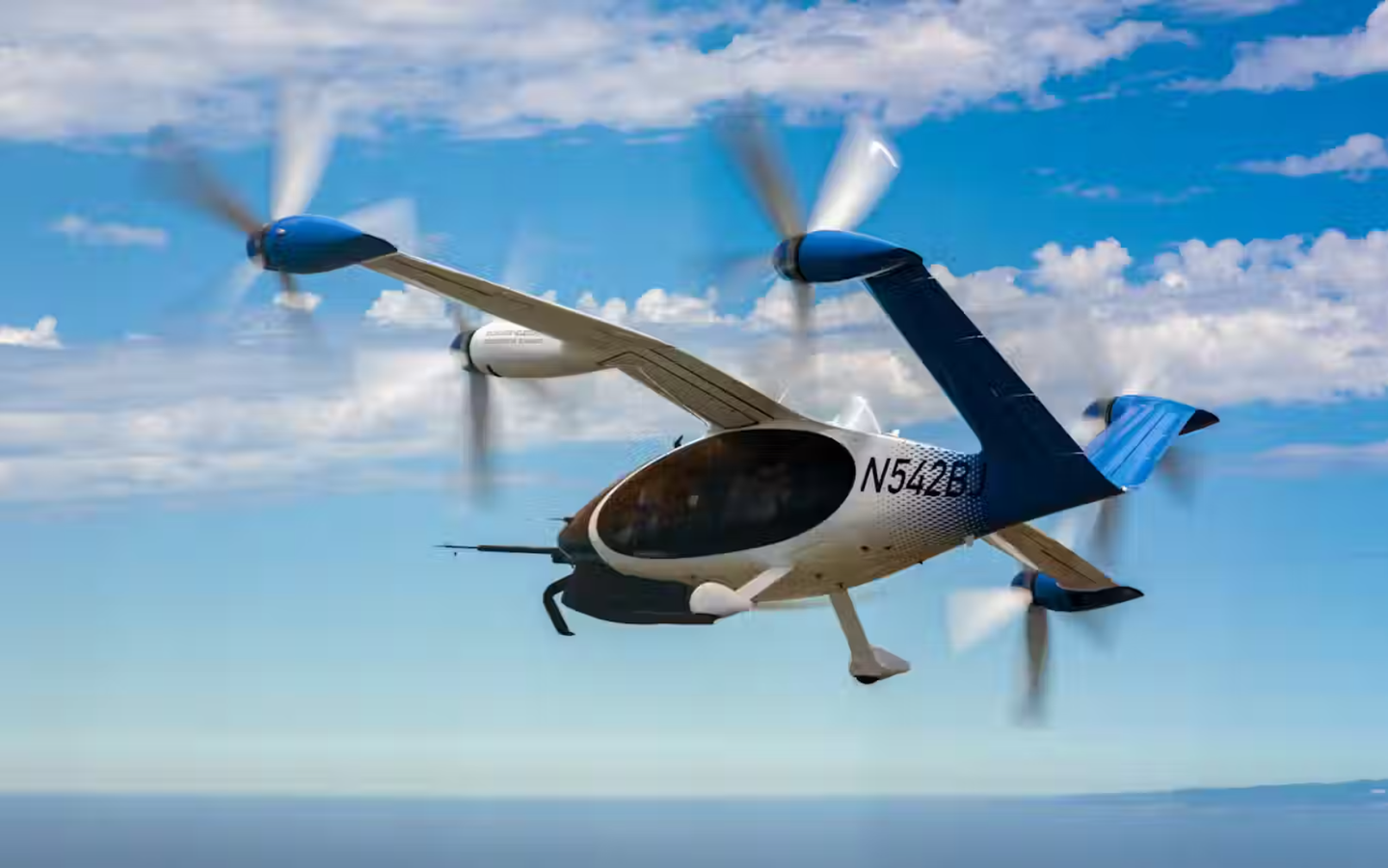Joby Aviation’s electric air taxi set to revolutionize urban mobility
Joby Aviation introduces electric air taxis, promising fast, quiet, emissions-free flights to revolutionize city transportation.

This new form of air travel has the potential to transform daily transportation across the world. (CREDIT: Joby Aviation)
Joby Aviation is set to change how city dwellers navigate their daily commutes, promising quiet, efficient air taxis that whisk passengers over traffic-filled streets. This electric vertical takeoff and landing (eVTOL) aircraft attracts large and curious crowds eager to see how they'll soon travel above congested roads.
A Quiet Revolution Above City Streets
The futuristic air taxi stands out because it combines helicopter-style vertical takeoff and landing with airplane-like cruising capabilities. Eric Allison, Joby’s Chief Product Officer, explains this feature’s benefit: it “frees you from the traffic in a way that you just can’t right now with any other technology.”
The aircraft achieves speeds up to 200 miles per hour, easily covering urban distances up to 100 miles, making daily commutes faster and easier.
One of Joby’s top priorities is noise reduction. The air taxi's innovative propellers tilt upwards for takeoff and then forward for flight. These specially designed blades ensure minimal sound disruption. Allison emphasized its near-silent operation, saying, “If it was flying over here at about a thousand feet, it basically would be silent. You wouldn’t hear it as it flies over.”
Transforming the Daily Commute
Los Angeles, notorious for heavy traffic, is one of Joby’s first target markets. Although Joby hasn't yet provided an official launch date, speculation points to the 2028 Olympics as a likely debut, aligning with citywide efforts to reduce car usage. Mayor-driven initiatives to ease congestion during major events could propel air taxis into everyday life.
Envision traveling from LAX airport to downtown in mere minutes rather than battling freeway traffic. Joby’s planned "vertiports" would integrate seamlessly into urban infrastructure, reachable by foot, bike, or rideshare, drastically simplifying travel in busy cities.
Related Stories
Allison believes air taxis will profoundly change urban mobility. “It starts to change how we think about moving around our cities,” he says, promising a future that is not only convenient but significantly better for the environment.
Expanding the Limits of Electric Flight
Beyond city travel, Joby Aviation explores extending their electric aircraft’s range using advanced hydrogen fuel cells. In a notable demonstration, their hydrogen-powered prototype recently completed a 523-mile journey, proving viability for longer flights such as San Francisco to San Diego. This breakthrough highlights hydrogen’s exceptional potential, having roughly 100 times the energy of current batteries and three times that of jet fuel.
Hydrogen's flexibility is equally promising. Produced using renewable sources like wind or solar, it presents a truly sustainable path for aviation. This aligns perfectly with global shifts towards greener energy. The U.S. Department of Energy, recognizing hydrogen's transformative power, has committed $7 billion toward developing national hydrogen infrastructure.
Taking Flight in Dubai
Joby recently reached a milestone by conducting successful piloted flights in Dubai, marking the start of their commercial readiness efforts in anticipation of carrying its first passengers in 2026. In partnership with Dubai’s Roads and Transport Authority (RTA), the aircraft performed flawlessly in demanding desert conditions. Joby secured exclusive rights to operate air taxis in Dubai for six years, setting the stage for a global expansion of air mobility.
Dubai's leadership envisions air taxis as part of an integrated transport system, connecting seamlessly with other travel methods. Joby plans to launch its air taxi service across key sites including Dubai International Airport, Palm Jumeirah, Dubai Marina, and Downtown Dubai, where vertiports are already being built. A flight from DXB to Palm Jumeirah is expected to take just 12 minutes—slashing a typical 45-minute car journey to a quick hop through the sky.
“The United Arab Emirates is a launchpad for a global revolution in how we move,” said JoeBen Bevirt, founder and CEO of Joby Aviation. “In addition to building a performant aircraft, we’ve also been maturing our program for anticipated passenger service with global operational capabilities and scalable, durable manufacturing. Our flights and operational footprint in Dubai are a monumental step toward weaving air taxi services into the fabric of daily life worldwide. With our visionary partners, we’re igniting a future where quiet, clean flight is the new normal, and we’re demonstrating the leadership of American innovation on the global stage.”
His Excellency Mattar Al Tayer, head of Dubai’s RTA, stated this aligns with the UAE’s broader ambition of advancing sustainable and innovative transportation. Al Tayer explained that air taxis would offer residents and visitors quick, safe, and smooth travel across key city destinations.
Dubai’s move toward commercial market readiness follows nearly two years of extreme heat testing at Edwards Air Force Base in the U.S.
Cost is another consideration. Early passengers are likely to be wealthier commuters eager to save precious time. However, Joby’s long-term vision includes making air taxis affordable for the broader public by scaling technology and expanding services globally.
Global Momentum for Clean Aviation
Joby Aviation aligns with a global trend toward reducing aviation's environmental footprint. Air travel currently contributes 2-3% of global greenhouse gas emissions, a figure expected to rise without intervention.
The International Civil Aviation Organization (ICAO) warns aviation’s environmental impact might quadruple by 2050 unless drastic changes occur. Joby’s electric and hydrogen-electric aircraft offer powerful solutions to this looming challenge.
By investing heavily in battery-electric and hydrogen-electric technologies, Joby aims to drastically reduce emissions. With over 40,000 miles of electric flight testing already completed, the company’s progress is undeniable.
These efforts not only promise cleaner skies but also pave the way toward more accessible, efficient, and environmentally friendly transportation solutions.
The air taxi concept signifies more than a technological advance; it's a complete transformation of urban life. Joby’s vision goes beyond convenience, reshaping cities into quieter, cleaner places with faster commutes and less congestion. Quiet, emissions-free flights promise more than just better transportation; they offer a healthier, happier urban environment.
Ready for Takeoff
As Joby Aviation moves toward commercial operation, anticipation grows worldwide. With successful flights in Dubai and extensive testing in the U.S., the dream of air taxis seems closer than ever.
Whether for short city hops or longer regional flights, Joby’s innovative approach represents the future of mobility, where quick, clean air travel becomes the everyday norm.
Note: Materials provided above by The Brighter Side of News. Content may be edited for style and length.
Like these kind of feel good stories? Get The Brighter Side of News' newsletter.
Rebecca Shavit
Writer
Based in Los Angeles, Rebecca Shavit is a dedicated science and technology journalist who writes for The Brighter Side of News, an online publication committed to highlighting positive and transformative stories from around the world. Her reporting spans a wide range of topics, from cutting-edge medical breakthroughs to historical discoveries and innovations. With a keen ability to translate complex concepts into engaging and accessible stories, she makes science and innovation relatable to a broad audience.



